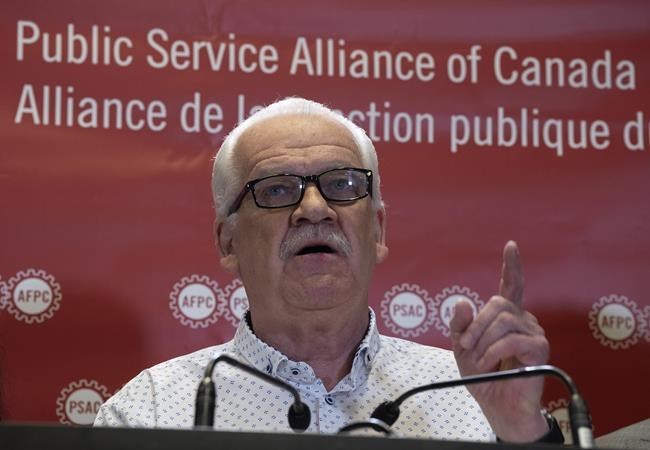The national president for the Public Service Alliance of Canada is calling the union's strike action a success after reaching tentative agreements with the federal government that secure wage increases meant to compensate workers for inflation.
The country's largest federal public-sector union said in the early hours of Monday morning that it reached deals with the government covering more than 120,000 public servants across the country and bringing them back to work after a 12-day strike.
The majority of federal workers who had been on the picket lines since April 19 were expected to sign in for duty on Monday morning or at their next scheduled shift.
But some 35,000 Canada Revenue Agency employees represented by PSAC's Union of Taxation Employees were still on strike Monday — the day of the federal tax-filing deadline — as negotiations over a separate collective agreement continued.
The CRA said in a statement that that the agency and the union have "resumed in-person negotiations with a view to reach a new collective agreement as soon as possible, that is both fair to employees and reasonable for taxpayers."
In an interview Monday afternoon, PSAC national president Chris Aylward credited members who were on the picket lines for securing the tentative agreements.
"(The strike) definitely enhanced our gains at the bargaining table," Aylward said. "We made gains on wages. And we made gains on a couple of other priority issues as well, such as remote work and seniority for layoffs."
The tentative agreements announced in the wee hours of Monday morning came after the Treasury Board, which oversees the administration of the federal government, tabled what it described as a "final offer" on Friday.
"This wasn't easy. We negotiated, we compromised and we found creative solutions," Treasury Board President Mona Fortier said in a news conference Monday afternoon.
"And after many long days, nights and weekends of hard work, we've reached fair and competitive deals for employees."
The tentative deals come after a push from the union for wage increases that compensate for inflation, along with a host of other demands, including language on remote-work arrangements, referred to in the public service as telework.
The agreements include 11.5 per cent wage increases over four years, with an additional 0.5 per cent group-specific allowance in the third year of the contracts. The union says the compounded wage increases add up to 12.6 per cent over four years.
Previously, the federal government had offered a nine per cent wage increase over three years, while the union was asking for 13.5 per cent over three years.
Workers will also be receiving a one-time, pensionable $2,500 lump sum payment that represents an additional 3.7 per cent of salary for the average union member in Treasury Board bargaining units.
Aylward conceded the union didn't get everything it wanted. But during the negotiation process, he said the bargaining team has to ask itself: "What are we actually keeping members out on strike for at this point?"
"And when you really can't answer that, basically, then you know that what you have is about the best you can possibly get," he said.
The union said that members will now have access to additional protection when the employer makes arbitrary decisions about remote work. Managers will have to assess telework requests individually, not by group, and provide written responses.
Fortier clarified that telework is addressed in a separate letter.
"As stated in a letter outside the collective agreement, a joint review will update our directive for the post-pandemic era, and additional mechanics will help address individual concerns," Fortier said.
Despite remote work not being included in the collective agreements themselves, Aylward stressed the importance of the federal government's commitment.
"It prevents the government from ever applying the one-size-fits-all approach," he said.
He said workers will have the ability to individually request a remote work arrangement and ask managers for an explanation if they choose to deny the request.
The tentative agreements also includes protections against the contracting out of work. According to the union, in the event of a layoff, an employee who can carry out work that is being conducted by a hired contractor will not lose their job.
PSAC said the deal also addresses its demands regarding seniority rights in the event of layoffs.
It said both parties have agreed to jointly submit a proposal to the Public Service Commission of Canada to include seniority rights in future "workplace adjustment" plans — or changes to the workforce to reflect the executive's priorities.
Public servants had hit picket lines at locations across the country for a dozen days in what the union said was one of the biggest job actions in Canadian history.
Service disruptions loomed large during the strike, from slowdowns at the border to pauses on new employment insurance, immigration and passport applications.
"We are going to resume activities as fast as we can," Fortier said Monday.
Initial negotiations on new collective agreements had initially begun in June 2021, and the union had declared an impasse in May 2022, with both parties filing labour complaints since then.
This report by The Canadian Press was first published May 1, 2023.
Nojoud Al Mallees, The Canadian Press




